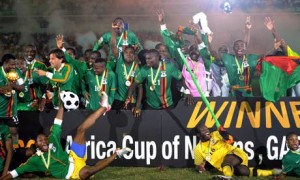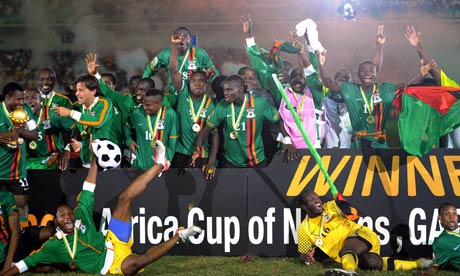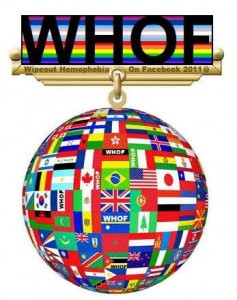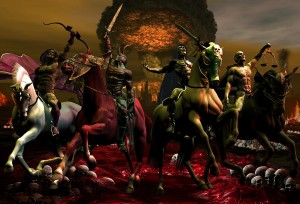 (On a pragmatic note, readers should interchange my use of the word ‘football’ for ‘soccer’.)
(On a pragmatic note, readers should interchange my use of the word ‘football’ for ‘soccer’.)
The 2012 African Cup of Nations concluded this evening, with the final squaring off Ivory Coast against Zambia. Did you watch it? This was a magnificently dramatic game between one of the best teams in world football and a team of unknowns and underdogs competing for a far nobler objective than petty fame and glory.
On April 27 1993, whilst en route to a qualification match against Senegal for the 1994 World Cup, the plane carrying the entire Zambian football team crashed on take off into the ocean only 547 yards from Libreville Airport in Gabon. Everyone in the aircraft died. For Zambia, then, to merely take part in a football tournament that was co-hosted by Gabon and neighbouring Equatorial Guinea was an act of tribute and remembrance for such an upsetting tragedy. What has happened in the preceeding weeks has stunned everyone; Zambia won their play-off group, shocked the world by beating tournament favourites and sporting heavy-weights Ghana to go on to a ACN final at the very site of the disaster. Already they had done more than enough to honour their fallen athletes.
But tonight’s struggle was an awesome crescendo of tension and excitement, as the plucky Chipolopolo (Copper Bullets) managed to hold their own against the mighty Ivory Coast. Their opponents comprised of some of the most famous names in football, playing at the most successful European (mostly British) clubs and having some of the highest sporting salaries in the world. Yet their combined skill couldn’t break through a solid Zambian defence, nor could they disable their heroic goalkeeper Kennedy Mweene. Despite great chances from Kolo Toure and Sol Bamba, and a virtual passport to victory that was ripped apart by Didier Drogba’s horrific penalty misfire, Zambia held the Ivorians all the way through ordinary and extra time to a nail-biting penalty shoot-out. After 12 kicks scored 12 goals it was the unfortunate Kolo Toure who suffered a stoic save by the powerful Mweene, and though Zambian midfielder Rainford Kalaba botched his attempt seconds later, it was Arsenal’s notorious bottler Gervinho who put Ivory Coast at a disadvantage on their 7th attempt. All Stophira Sunzu, who’d shown his own feat of heroism by blocking Toure’s wary strike in the second half, had to do was score, which he did with uproarious celebration that rocked the Stade d’Angondje.
In the minutes before the awarding of the African Cup of Nations trophy Zambian striker and team captain Christopher Katongo was named player of the tournament. He shook hands with the official with a grimace of shyness and humility, magnified tenfold as he was given the tournament trophy moments later to hold proudly aloft. Despite the genuine joy in his smile you could clearly see he didn’t want any of this PR theatrics. He just wanted to share the happiness and euphoria with his team mates, the proud men who carried a huge banner honouring their deceased sportsmen with them as their received their medals and shook hands with the tournament officials. These Zambians, Africans, men of dignity and modesty, were happy enough that they had served well the memory of their countrymen. Any publicity, any front-page news was irrelevant. The feeling of community, friendship, leadership, brotherhood, that is far more important to them than fancy trophies or stirring copy.
This could not contrast more with the responses and reactions British clubs, players and the British public exhibit within football. Victory here means nothing joyful. Winning doesn’t create a feeling of celebration that everyone should be a part of, including the losing team. Victory here means ammunition for a club’s supporters to use against the other club’s supporters. It means rioting and violence because your team lost, even if they scored half a dozen goals. It means players receiving more money from one match than the majority of the British population make in a decade are less excited about achieving victory than leaving the pitch as fast as they can to rent an army of prostitutes to accompany them to exclusive nightclubs and snorting the finest grade cocaine and buying bottles of champagne that cost more than your house. In Britain, football is not a ‘hobby’, it’s a cult, a poisonous playground game used as an excuse for some of the most appalling violence, vandalism and racism seen in our society. English footballers (because Scottish, Welsh and Northern Irish footballers appear, for the most part, to have a better sense of decency) are ignorant, ego-driven, sociopathic sexual pradators who are deified by press and public alike because of their pseudo-hypermasculinity. There are no shortage of ‘scandals’, of footballers busted for publicly taking drugs, cheating on their wives and being racially abusive to even their own teammates, with many individuals repeateding the same offenses. It’s depressing, especially since football is seen as some kind of cultural embodiment of British public feeling and that this nation’s mood can be either elated or enraged based on the success of 11 extremely unpleasant men kicking a ball around a field for 90 minutes.
So I’d much rather share in the joy of Zambia, a nation in dire poverty and ravaged by HIV who at least have a little shard of comfort and a reason to smile tonight. The Chipolopolo did them proud, and did the rest of the world proud too because of their honest sportsmanship and humble courage, showing us here in the white world that there are many lessons we need to learn from our African brothers and sisters.
A Night of Magic in Libreville,



